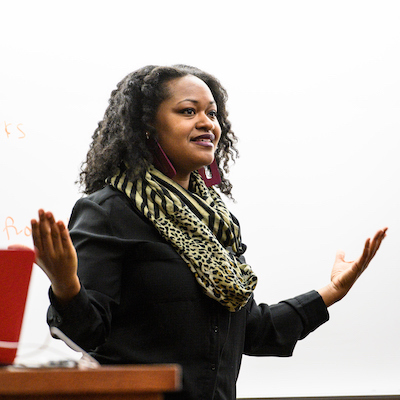UW-Madison’s Bianca Baldridge recently published a paper in the journal Race Ethnicity and Education that’s titled, “Negotiating anti-black racism in ‘liberal’ contexts: the experiences of black youth workers in community-based educational spaces.”
Baldridge explains in the paper’s abstract that her research “challenges liberal and progressive claims of social justice in education within predominantly white cities that reify anti-Black racism.”

Baldridge is a sociologist of education and an assistant professor with the School of Education’s Department of Educational Policy Studies. She has spent two decades engaged in community-based youth work as a curriculum developer and educator alongside minoritized youth working towards educational freedom and justice.
This paper came out of research made possible from a National Academy of Education/Spencer Postdoctoral Fellowship Baldridge received in 2016.
Baldridge writes how her study “examines how Black community-based youth workers navigate anti-Black racism in their educational programming with black youth in a majority white college town widely recognized as ‘nice,’ ‘liberal,’ and ‘progressive,’ with stark racial disparities between its Black and white residents.”
The abstract adds: “With racial liberalism and BlackCrit as theoretical guides, this paper draws on in-depth interviews with Black youth workers and observations at city events addressing racial disparities facing Black youth to understand how anti-Black racism within the larger city informs community-based educational programming.”
Baldridge reports that findings from her research “indicate a 1) disregard of Black suffering, 2) deliberate shutdown of critical race dialogue and programming, and 3) the exploitation of Black youth workers’ labor and the denial of advancement to positions of leadership within organizations to do white discomfort.”
Baldridge concludes her article by writing: “Predominantly white cities espousing a liberal ethos that claim to believe in social justice, yet continuously sustain structural racism that impedes the educational experiences of Black youth should be interrogated theoretically and empirically so that resistance and disruption can occur.”
“My hope is that people take seriously the experiences of Black youth workers as educators and mediators in the lives of Black youth,” says Baldridge, who authored the 2019 award-winning book, “Reclaiming Community: Race and the Uncertain Future of Youth Work.”
“Their work should be respected and they should be adequately compensated for their expertise,” she adds. “As a profession, youth work is rewarding and also quite precarious. I encourage those in Madison to support efforts in Dane County to pay all youth workers in community-based programs a living wage and to truly value the work they do with and alongside young people.”
To dig much deeper into this important topic, check out the entire Baldridge paper via this journal web page.